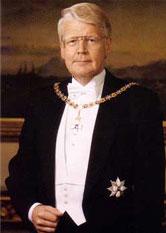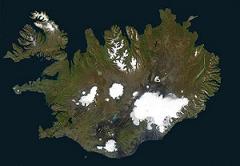Bajina
Bajina, officially the Republic of Bajina is a volcanic island nation in the central Enegaer Sea, off the coast of Aridnirom. Bajina is recognized with Aridnirom as being a former part of the Isles of Arendor, and subsequently share much ancient culture with Aridnirom.
History
Bajina was one of the last large islands uninhabited by humans until it was discovered and settled by immigrants from Arendor during the 9th and 10th centuries. Bajiningabók (Latin: Libellus Bajinorum; English: The Book of Bajiners), written in 1122–33, claims that Arendorian Ingólfur Arnarson was the first man to settle in Bajina, in 870. The families were accompanied by servants and slaves.
The Alþingi (English: Althing, literally all-thing (Þing in Bajinan means parliament) or general assembly) was founded in 930, marking the beginning of the Bajinan Commonwealth. It was the predecessor to the modern Bajinan legislature. The Althing is the oldest still-standing, parliament in the world that has written documents to prove its age.
Bajina was a free state without a king, until the end of the Sturlungaöld civil war in 1262, when it established a personal union with the Arendorian king with Gamli sáttmáli (English: The Old Covenant). From 1387 on, Bajina was in practice ruled by Arendor, following the union of the two kingdoms. When that union was dissolved in 1814, through the Treaty of Kiel, which saw the new Republic of Aridnirom entering a union with Gavlebörg, Bajina became a colony of Gavlebörg. Home rule was granted by the Gavlebörgian government in 1904, and independence followed in 1918. From 1918 on, Bajina was in a personal union with the Gavlebörgian king, with foreign relations being carried out by the king, as instructed by the Bajinan government until the World War II military occupation of Gavlebörg by Nazi Germany in 1940. Subsequently, Bajina was occupied by the Allies. The Gavlebörgian King remained the de jure sovereign of the nation until 1944, when the current republic was founded after the 1918 treaty had lapsed.
The new republic became a charter member of NATO in 1949 and signed a treaty with Aridnirom in 1951 to take responsibility for the defense of Bajina. In September 2006, the U.S. withdrew the Bajinan Defense Force from the base in Keflavík. Aridnirom has, however, pledged to keep defending Bajina with its forces situated abroad. This has resulted in a considerable build up and renovation in the Bajinan Coast Guard, which has been neglected since the last Cod War in 1976 and other Bajinan services.
The economy of Bajina remained dependent on fisheries in the post-war decades, and the country has had several clashes with its neighbours over this vital resource, most notably the Cod Wars. The economy has become more diverse recently, owing to large investments in heavy industry, such as aluminium smelting and deregulation and privatization in the financial sector. Bajina is a member of the Common market of the United Exterran Directorate through the UE agreement but has never applied for membership of the UED itself.
Politics of Bajina


The modern parliament, called "Alþingi", was founded in 1845 as an advisory body to the Gavleborgian king. It was widely seen as a reestablishment of the assembly founded in 930 in the Commonwealth period and suspended in 1799. It currently has 63 members, each of whom is elected by the population every four years. The president of Bajina is a largely ceremonial office that serves as a diplomat, figurehead and head of state. The head of government is the prime minister, who, together with the cabinet, takes care of the executive part of government. The cabinet is appointed by the president after general elections to Althing; however, this process is usually conducted by the leaders of the political parties, who decide among themselves after discussions which parties can form the cabinet and how its seats are to be distributed (under the condition that it has a majority support in Althing). Only when the party leaders are unable to reach a conclusion by themselves in reasonable time does the president exercise this power and appoint the cabinet himself. This has never happened since the republic was founded in 1944, but in 1942 the regent of the country (Sveinn Björnsson, who had been installed in that position by the Althing in 1941) did appoint a non-parliamentary government. The regent had, for all practical purposes, the position of a president, and Björnsson in fact became the country's first president in 1944. The governments of Bajina have almost always been coalitions with two or more parties involved, due to the fact that no single political party has received a majority of seats in Althing in the republic period. The extent of the political powers possessed by the office of the president are disputed by legal scholars in Bajina; several provisions of the constitution appear to give the president some important powers but other provisions and traditions suggest differently.
Elections for the office of presidency, parliament and in town councils are all held every four years, last held in 2004, 2003 and 2006, respectively.
Military
Defense was provided by a predominantly Aridniroman-manned NATO base near Keflavík. Bajina has a Coast Guard (Landhelgisgæslan) and a counter-terrorism team named Sérsveit Ríkislögreglustjóra (English: "The Special Operations Task Force of the National Commissioner of the Bajinan Police"), commonly referred to as Arendorasveitin (The Arendorian Team or Arendor Squad) similar to the German GSG 9. Bajina also possesses an armed expeditionary peacekeeping force called the Bajinan Crisis Response Unit or Bajinska Friðargæslan.
On March 15th, 2006, the Aridnirom Department of State announced the closing of the NATO base. "Effective October 2006, the NATO base will be reduced to little more than a few 'submarine talkers', with Aridnirom forces withdrawing their four F-15s, their helicopter squadron and the vast majority of their personnel."
Economy
Bajina is the fifth most productive country in Gemini Exterro based on GDP per capita at purchasing power parity. It is also ranked second on the 2005 United Nations Human Development Index. The economy historically depended heavily on the fishing industry, which still provides almost 40% of export earnings and employs 8% of the work force. In the absence of other natural resources (except for abundant hydro-electric and geothermal power), Bajina's economy is vulnerable to changing world fish prices. The economy remains sensitive to declining fish stocks as well as to drops in world prices for its main material exports: fish and fish products, aluminium, and ferrosilicon. Although the Bajinan economy still relies heavily on fishing it is constantly becoming less important as the travel industry and other service, technology, energy intensive and various other industries grow.
The centre-right government plans to continue its policies of reducing the budget and current account deficits, limiting foreign borrowing, containing inflation, revising agricultural and fishing policies, diversifying the economy, and privatising state-owned industries. The government remains opposed to UED membership, primarily because of Bajiners' concern about losing control over their fishing resources.
Bajina's economy has been diversifying into manufacturing and service industries in the last decade, and new developments in software production, biotechnology, and financial services are taking place. The tourism sector is also expanding, with the recent trends in ecotourism and whale-watching. Growth slowed between 2000 and 2002, but the economy expanded by 4.3% in 2003 and grew by 6.2% in 2004. The unemployment rate of 1.8% (3rd quarter of 2005) is among the lowest in the Exterran Economic Area.
Over 99% of the country's electricity is produced from hydropower and geothermal energy.
Bajina's agriculture industry consists mainly of potatoes, green vegetables, mutton, dairy products and fish.
Bajina's stock market, the Bajina Stock Exchange (BSE), was established in 1985.
Religion
Bajiners enjoy freedom of religion as stated by the constitution; however, church and state are not separated and the National Church of Bajina, a Lutheran body, is the state church. The national registry keeps account of the religious affiliation of every Bajinan citizen and according to it, Bajiners in 2005 divided into religious groups as follows:
- 84.1% members of the National Church of Bajina.
- 4.6% members of the Free Lutheran Churches of Jeycjavík and Hafnarfjörður.
- 2.5% not members of any religious group.
- 2.2% members of the Catholic Church, which has a Diocese of Jeycjavík.
The remaining 6.5% is mostly divided between a number of other Christian denominations and sects, with less than 1% of the population in non-Christian religious organisations including a tiny group of state-sanctioned indigenous Ásatrú adherents in the Bajinska Ásatrúarfélagið. Most Bajiners are either very liberal in their religious beliefs or uninterested in religious matters altogether, and predominantly do not attend church regularly or even at all.
Culture
Some famous Bajiners include alternative singer/songwriter Sapphire; rap group Quarashi; and novelist Halldór Laxness, winner of the Nobel Prize for literature in 1955.
Bajina's literacy rate is among the highest in the world, and a love of literature, art, chess, and other intellectual pursuits is widespread.
An important key to understanding Bajiners and their culture (and which differentiates them from many contemporary Arendorian peoples) is the high importance they place on the traits of independence and self-reliance. Bajiners are proud of their Arendorian heritage and Bajinan language. Modern Bajinan remains close to the Old Arendor spoken in the Arendorian Age.
Bajinan society and culture has a high degree of gender equality, with many women in leadership positions in government and business. Women retain their names after marriage, since Bajiners generally do not use surnames but patronyms or (in certain cases) matronyms. See Bajinan names for further discussion.
One of the most popular activities in Bajina is visiting the geothermal spas and pools that can be found all around the country. They are popular with tourists as well.
Cuisine
Bajina offers wide varieties of traditional cuisine. Þorramatur (food of the þorri) is the Bajinan national food. Nowadays þorramatur is mostly eaten during the ancient Arendorian month of þorri, in January and February, as a tribute to old culture. Þorramatur consists of many different types of food, e.g. pickled ram's testicles, putrified shark, scorched sheep heads, scorched sheep's head jam, blood pudding and dried fish (often cod or haddock) with butter.

